
Fottea
metrics 2024
Pioneering studies that shape the future of phycology.
Introduction
Fottea is a prestigious journal, published by the Czech Phycological Society, dedicated to advancing the field of plant sciences with a specific focus on freshwater algal research. Established in 2008, this quarterly publication has steadily gained recognition, evidenced by its impressive Q2 ranking in Plant Science and a solid placement within the 68th percentile among its peers in Scopus rankings. Fottea serves as a vital platform for researchers, professionals, and students to disseminate and access cutting-edge studies, fostering collaboration and innovation within the aquatic ecosystem research community. Although currently operating under a traditional publishing model without open access options, it remains committed to providing high-quality, peer-reviewed content that is essential for the progression of phycology and related disciplines. With its base in the beautiful Czech Republic, the journal aims to bridge local and global research efforts, contributing to the broader understanding of algal biology and ecology.
Metrics 2024
 0.45
0.45 1.50
1.50 2.20
2.20 33
33Metrics History
Rank 2024
Scopus
IF (Web Of Science)
JCI (Web Of Science)
Quartile History
Similar Journals

OCEANOLOGICAL AND HYDROBIOLOGICAL STUDIES
Illuminating the science of our blue planet.OCEANOLOGICAL AND HYDROBIOLOGICAL STUDIES, published by WALTER DE GRUYTER GMBH, serves as a crucial platform for the dissemination and discussion of pivotal research in the field of oceanography and hydrobiology. With an ISSN of 1730-413X and an E-ISSN of 1897-3191, this journal highlights interdisciplinary studies that address pressing ecological issues impacting marine environments. Although it currently ranks in the Q4 category of oceanography journals and holds a Scopus rank of 96 out of 145, its commitment to publishing high-quality research positions it as a valuable resource for researchers, professionals, and students alike. As it converges into 2024, OCEANOLOGICAL AND HYDROBIOLOGICAL STUDIES remains dedicated to advancing our understanding of aquatic systems, contributing significantly to the scientific community's efforts in ocean conservation and management.

Zoosystematics and Evolution
Elevating the discourse on systematics and evolution.Zoosystematics and Evolution is a premier peer-reviewed journal dedicated to the fields of animal science, zoology, and evolution, published by Pensoft Publishers. With a commendable Q1 ranking in multiple categories including Animal Science and Zoology, Ecology, Evolution, Behavior and Systematics, as well as Insect Science, this journal stands out as a vital resource for researchers and professionals engaged in the dynamic study of biodiversity and systematics. Since transitioning to Open Access in 2014, it has ensured that groundbreaking research is readily available to a global audience, thus fostering collaborative advancements and facilitating the dissemination of knowledge. The journal has a significant presence in both Scopus and various academic indices, enhancing its reputation and impact within the scientific community. Based in Bulgaria, at 12 Prof Georgi Zlatarski St, Sofia, the journal continues to thrive, contributing valuable insights that drive scientific inquiry and exploration in the ever-evolving realm of zoological research.
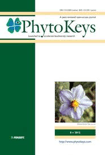
PhytoKeys
Exploring the frontiers of agricultural sciences.PhytoKeys is a prominent open-access journal published by PENSOFT PUBLISHERS that has become a vital resource in the fields of Agricultural and Biological Sciences, Ecology, Evolution, Behavior and Systematics, and Plant Science. Since its inception in 2010, PhytoKeys has provided a platform for researchers and scholars to disseminate high-quality botanical research, making it increasingly relevant globally. The journal enjoys a commendable impact factor reflected in its 2023 ranking, positioning it in the Q2 quartile across multiple categories, including the 61st percentile in Agricultural and Biological Sciences (miscellaneous) and the 53rd percentile in Plant Science. With a dedicated editorial board and a mission to advance our understanding of plant diversity, taxonomy, and conservation, PhytoKeys supports the academic community by facilitating accessibility to cutting-edge research. Its commitment to open access ensures that valuable knowledge is readily available to researchers, professionals, and students worldwide, fostering collaboration and innovation in plant sciences.
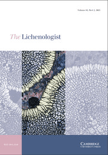
LICHENOLOGIST
Connecting Research and Conservation in Lichen StudiesLICHENOLOGIST is a prestigious journal published by Cambridge University Press, dedicated to advancing the field of lichenology and promoting a deeper understanding of the ecology, evolution, and systematics of lichens. Established in 1958 and focusing on the convergence of research through 2024, this journal has established itself as a significant resource within the Q2 category of Ecology, Evolution, Behavior and Systematics. With a Scopus ranking of #316 out of 721 in its field, it highlights research that not only enhances academic knowledge but also has practical implications for ecology and conservation efforts globally. Although traditionally not an open-access journal, it provides valuable insights and contributes to the scientific community by disseminating high-quality, peer-reviewed research. LICHENOLOGIST is essential for researchers, professionals, and students looking to stay informed about the latest advancements in lichen studies, making it an indispensable resource for anyone involved in ecological and biological sciences.
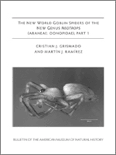
BULLETIN OF THE AMERICAN MUSEUM OF NATURAL HISTORY
Connecting scholars to the latest in natural history advancements.BULLETIN OF THE AMERICAN MUSEUM OF NATURAL HISTORY, published by the American Museum of Natural History, represents a cornerstone of scholarly communication in the fields of Agricultural and Biological Sciences and Ecology. With an impressive impact factor highlighted by its Q1 quartile rankings in both categories, the journal publishes high-quality, peer-reviewed research that significantly contributes to the understanding of natural history. Researchers will find this journal indispensable as it covers a diverse range of topics, providing insights that drive ecological research and biological discovery forward. Although not open access, the Bulletin is widely available through institutional subscriptions, making it accessible to both established professionals and students eager to stay informed about the latest advancements in the field. Its commitment to advancing knowledge from 1996 to the present ensures that it remains relevant and highly regarded within the scientific community.
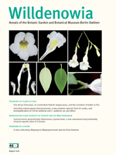
Willdenowia
Transforming the landscape of plant research and ecology.Willdenowia is a prestigious scientific journal published by the Botanischer Garten & Botanische Museum Berlin-Dahlem, dedicated to advancing the field of botany and plant sciences. With an ISSN of 0511-9618, this journal has established itself as a crucial platform for researchers, practitioners, and students interested in ecology, evolution, behavior, systematics, and plant science. The journal boasts an impactful reputation, evidenced by its impressive Q1 and Q2 quartile rankings in Plant Science and Ecology, Evolution, Behavior and Systematics respectively, as well as notable Scopus rankings, placing it within the top quartiles of its categories. Although access is not open, articles published in Willdenowia contribute significantly to the global body of botanical research, making it an essential resource for anyone looking to deepen their understanding of plant biology and related ecological disciplines. The journal has continuously evolved since its inception and aims to facilitate interdisciplinary collaboration and knowledge dissemination in the life sciences.
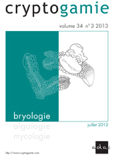
CRYPTOGAMIE BRYOLOGIE
Exploring the Hidden Wonders of BryophytesCRYPTOGAMIE BRYOLOGIE is a prominent academic journal published by ADAC-CRYPTOGAMIE, focusing on the intricate field of bryology—the study of mosses and other bryophytes. Established in 1999 and continuing its commitment to scholarly excellence through to 2024, this journal serves as a vital platform for researchers, professionals, and students invested in ecosystem dynamics, plant sciences, and evolutionary biology. Recognized for its rigorous peer-review process and notable contributions, CRYPTOGAMIE BRYOLOGIE holds esteemed rankings, with a Q3 categorization in Ecology, Evolution, Behavior and Systematics and Q2 in Plant Science as of 2023. While the journal operates without open access, its articles are essential for advancing knowledge and fostering discussion in the disciplines it serves. Given its strategic position within the Scopus Ranks, where it occupies significant rankings in the domains of Plant Science and Ecology, the journal is poised to influence ongoing research and inspire future studies in the rapidly evolving world of bryophytes.
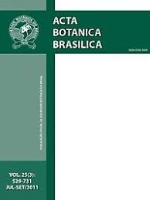
Acta Botanica Brasilica
Fostering Innovation in Plant Biology and EcologyActa Botanica Brasilica is a prestigious open-access journal dedicated to the field of botany and plant science, published by SOC BOTANICA BRASIL. With an ISSN of 0102-3306 and E-ISSN of 1677-941X, it has been a vital resource for the academic community since its inception in 1987, fostering the dissemination of research and knowledge related to plant biology and ecology. Hailing from Brazil, the journal serves as a platform for researchers to share valuable insights on plant species, their habitats, and important ecological interactions. As of 2023, the journal holds a Q3 ranking in Plant Science and is recognized within the Scopus database, where it ranks #263 out of 516, placing it in the 49th percentile among its peers. This broad accessibility and commitment to quality research make Acta Botanica Brasilica an essential publication for botanists, ecologists, and other professionals in the life sciences, bridging gaps in knowledge and advancing the field with original articles, reviews, and comprehensive research findings.
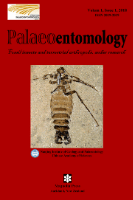
Palaeoentomology
Connecting the Dots of Time: Fossils, Insects, and Ecosystem DynamicsPalaeoentomology is a leading journal dedicated to the study of fossil insects, fostering a deeper understanding of historical biodiversity and ecosystem dynamics. Published by MAGNOLIA PRESS, this journal provides an essential platform for researchers, educators, and students interested in entomological paleontology and related disciplines. Featuring a wide range of articles that explore fossil records, evolutionary patterns, and paleoenvironments, it serves the scientific community by enriching our understanding of the past. Although currently not open access, the journal prioritizes rigorous peer-review standards and aims to maintain a high impact factor, ensuring that published research meets the evolving demands of the field. Based in Auckland, New Zealand, it welcomes contributions from both established and emerging scientists worldwide, contributing to a vibrant discourse in the study of ancient insects and their ecological relationships.

BRITTONIA
Exploring the Richness of Botany and EcologyBRITTONIA, published by Springer, stands as a reputable journal dedicated to advancing the fields of botany and plant sciences. With a storied history dating back to 1931, this journal has evolved to embrace contemporary research spanning various aspects of plant biology, ecology, and systematics. Focusing on a comprehensive analysis of both ecological interactions and plant systematics, BRITTONIA plays a crucial role in disseminating knowledge among researchers and professionals committed to understanding plant life and its environmental contexts. Despite its open access status being currently unavailable, the journal ensures wide accessibility through institutional subscriptions. In the latest rankings, it proudly holds a Q2 category in Plant Science and a Q3 category in Ecology, Evolution, Behavior, and Systematics, indicating its growing influence and academic rigor. Researchers and students alike will find BRITTONIA an essential resource for the latest findings and discussions in plant sciences.